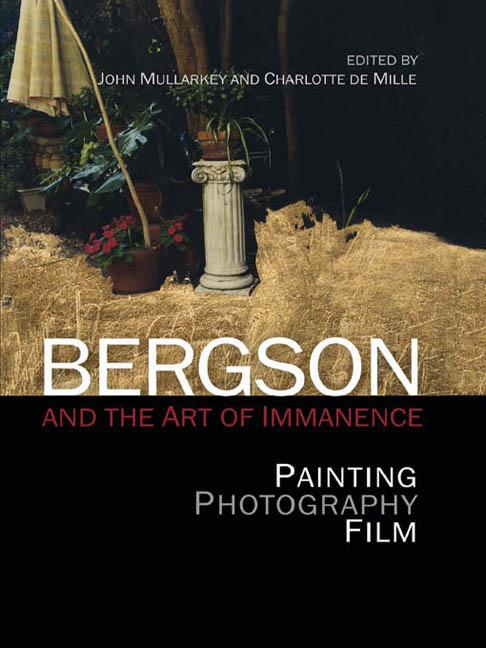Book contents
- Frontmatter
- Contents
- List of Illustrations
- Notes on Contributors
- Introduction: Art's Philosophy – Bergson and Immanence
- Part I Bergson, Art, History
- 1 Bergson, History and Ontology
- 2 Art History, Immanently
- 3 Art History, Less Its Conditions of Possibility: Following Bergson's ‘Le Possible et le réel’
- 4 Matisse, Bergson, Oiticica, etc.
- 5 Bergson Before Deleuze: How to Read Informel Painting
- 6 Revolutionary Immanence: Bergson Among the Anarchists
- Part II Unconditional Practice
- Part III Immanence of the Visible
- Afterword: An Art Historical Return to Bergson
- Index
1 - Bergson, History and Ontology
from Part I - Bergson, Art, History
Published online by Cambridge University Press: 07 December 2017
- Frontmatter
- Contents
- List of Illustrations
- Notes on Contributors
- Introduction: Art's Philosophy – Bergson and Immanence
- Part I Bergson, Art, History
- 1 Bergson, History and Ontology
- 2 Art History, Immanently
- 3 Art History, Less Its Conditions of Possibility: Following Bergson's ‘Le Possible et le réel’
- 4 Matisse, Bergson, Oiticica, etc.
- 5 Bergson Before Deleuze: How to Read Informel Painting
- 6 Revolutionary Immanence: Bergson Among the Anarchists
- Part II Unconditional Practice
- Part III Immanence of the Visible
- Afterword: An Art Historical Return to Bergson
- Index
Summary
Since the revival of Bergson studies, a key aspect of his work has remained largely dormant amongst scholars: his philosophy of history. In this chapter, I will address this under-explored area of investigation by making some suggestions as to what Bergsonian philosophy might have to offer our understanding of history. This task will be guided throughout by a concern for the ontological nature of history. Although Bergson's thoughts on history are often considered to be restricted to his Two Sources of Morality and Religion, I will demonstrate how Bergson develops and deploys an ontology of history and an historical ontology in his earlier texts that arguably play a significant role within his broader thinking. In so doing, Bergsonian philosophy will be shown to advance strategies for escaping the traditional and dominant conceptions of history as representational, causal-linear and teleological – strategies that are subsequently expanded upon and modified by Bergsonian thinkers such as Charles Peguy, Arnold Toynbee and Gilles Deleuze.
BERGSON AND HISTORY?
Before embarking upon an exploration of Bergson and history, it must be noted that at present there is no consensus on whether it is feasible, let alone of value, to extract a philosophy of history from Bergson's thought or make use of his concepts for understanding the nature of history. There is a Bergsonian philosophy of time of course, but as for a Bergsonian philosophy of history, there is some scepticism within the Bergsonian community as to whether it exists or even could. As one eminent Bergsonian puts it, the suggestion that ‘the resources of the ontological past … are open to the historian’ is ‘highly provocative’ and ‘needs to be adequately demonstrated and argued for’. For someone such as myself with an interest in the nature of history, this statement is rather perplexing. While it is true that Bergson never explicitly set out a fully formed philosophy of history under that title, the relevance of issues such as time, free will, memory and evolution to the field of history and its theorisation is both evident and long standing. To demonstrate, using the least obvious example on this list: philosophers of science and history would agree that particular notions of history are of great importance to evolutionary theories.
- Type
- Chapter
- Information
- Bergson and the Art of ImmanencePainting, Photography, Film, Performance, pp. 17 - 31Publisher: Edinburgh University PressPrint publication year: 2013



